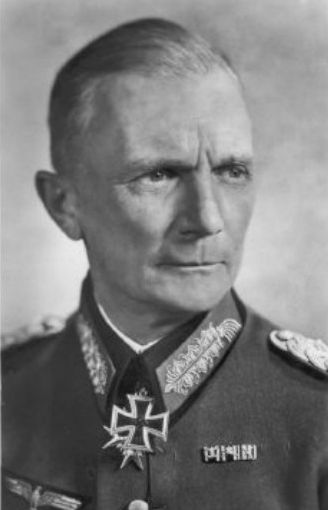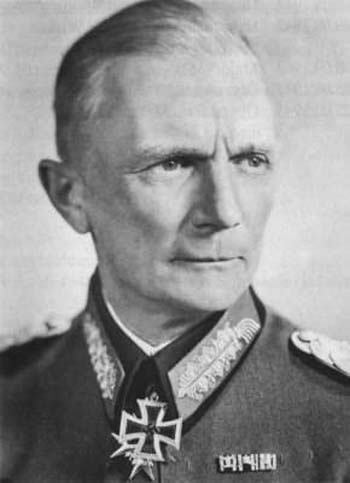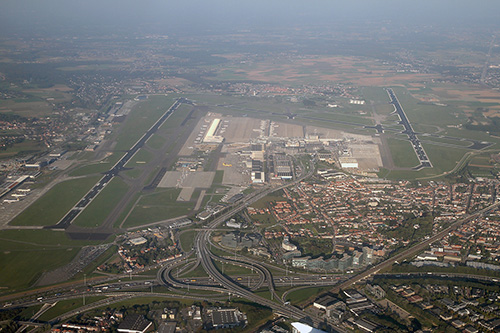Bock, von, Moritz Albrecht Friedrich Franz Fedor
- Date of birth:
- December 3rd, 1880 (Kustrin/Brandenburg, German Empire)
- Date of death:
- May 4th, 1945 (Oldenburg/Schleswig-Holstein, Germany)
- Buried on:
- German War Graves St. Katharinafriedhof
- Nationality:
- German
Biography
Fedor von Bock was born December 3rd, 1880 in Kustrin, Germany as son of an army officier. He completed officer's training in 1898 and became a Lieutenant (Leutnant). In 1910, he started schooling to join the General Staff and was admitted in 1912 in the rank of Captain. A year after, he joined the General Staff of the Guards Corps (Garde Korps) in which he entered WW 1. in 1914. During this war he saw action on the Eastern, as well as on the Western front. In April 1918, he was awarded Germany's highest decoration, the Pour le Mérite.
When Hitler had risen to power, he took a neutral stand concerning the Nazis. In 1936, he was married to Wilhelmine von der Osten and in 1938, he was promoted to Colonel-general (? Generaloberst ?). Following the German take-over of the Sudetenland, he was named its 'Verwalter' i.e. the highest authority. November 1st, 1938, he was put in command of Heeresgruppe 1 (Armygroup) in Berlin. He was involved in the invasion of Poland and at the end of the Polish campaign was awarded the Ritterkreuz (Knight's Cross). During the invasion of France and the Low Countries in May and June 1940, Von Bock was Commander in Chief of Heeresgruppe B. June 22nd, 1941, saw the beginning of Operation Barbarossa, the German invasion of the Soviet Union and Von Bock was put in command of Heeresgruppe Mitte (Armygroup Centre). Hitler and von Bock were soon in disagreement over military strategy in the Soviet Union. October 1941, he was ordered to capture Moscow but Operation Typhoon failed dramatically. Because of the horrendous losses in this operation, Von Bock suggested a retreat and in doing so suffered the same fate as nearly 40 other generals, sacked by Hitler for defeatism. A few weeks later however, after the unexpected death of Fieldmarshall Walter von Reichenau, commander of Heeresgruppe Süd, Von Bock was back in favor and named his successor. Summer 1942, he clashed with Hitler again and this time was relegated to the Reserves. He spent the last years of the war quietly in Bavaria. After Hitler's death, he offered his services to the new government, led by Dönitz in Flensburg. May 3rd, 1945, on his way to Flensburg, Schleswig-Holstein, his car was attacked by RAF fighterbombers. Fedor von Bock was mortally wounded and died the next day.
Do you have more information about this person? Inform us!
- Period:
- First World War (1914-1918)
- Rank:
- Hauptmann i.G.
- Awarded on:
- September 18th, 1914
- Period:
- First World War (1914-1918)
- Rank:
- Hauptmann i.G.
- Awarded on:
- October 30th, 1915
- Period:
- First World War (1914-1918)
- Rank:
- Hauptmann i.G.
- Awarded on:
- June 24th, 1915
- Period:
- First World War (1914-1918)
- Rank:
- Hauptmann i.G.
- Awarded on:
- October 25th, 1916
- Period:
- First World War (1914-1918)
- Rank:
- Major i.G.
- Awarded on:
- February 9th, 1917
- Period:
- First World War (1914-1918)
- Rank:
- Major i.G.
- Awarded on:
- September 19th, 1917
- Period:
- First World War (1914-1918)
- Rank:
- Major i.G.
- Awarded on:
- January 10th, 1918
- Period:
- First World War (1914-1918)
- Rank:
- Major i.G.
- Awarded on:
- April 1st, 1918
- Period:
- First World War (1914-1918)
- Rank:
- Major i.G.
- Awarded on:
- August 2nd, 1918
- Period:
- First World War (1914-1918)
- Awarded on:
- 1920
- Period:
- First World War (1914-1918)
- Rank:
- Generalleutnant (Major-general)
- Awarded on:
- December 14th, 1934
- Period:
- First World War (1914-1918)
- Rank:
- General der Infanterie (Lieutenant-General of Infantry)
- Awarded on:
- October 2nd, 1936
- Period:
- Second World War (1939-1945)
- Rank:
- Generaloberst (General)
- Awarded on:
- September 12th, 1939
- Period:
- Second World War (1939-1945)
- Rank:
- Generaloberst (General)
- Awarded on:
- September 22nd, 1939
- Awarded for:
- Operation Fall Weiss
- Period:
- Second World War (1939-1945)
- Rank:
- Generaloberst (General)
- Unit:
- Heeresgruppe Nord, Heer
- Awarded on:
- September 22nd, 1939
- Awarded for:
- Operation Fall Weiss
- Period:
- Second World War (1939-1945)
- Rank:
- Generaloberst (General)
- Unit:
- Heeresgruppe Nord, Heer
- Awarded on:
- September 30th, 1939
- Awarded for:
- Operation Fall Weiss
- Period:
- Second World War (1939-1945)
- Rank:
- Generalfeldmarschall (Field Marshall)
- Awarded on:
- August 27th, 1940
- Period:
- Second World War (1939-1945)
- Rank:
- Generalfeldmarschall (Field Marshall)
- Awarded on:
- August 7th, 1941
- Period:
- Second World War (1939-1945)
- Rank:
- Generalfeldmarschall (Field Marshall)
- Awarded on:
- September 19th, 1941
- Period:
- Second World War (1939-1945)
- Rank:
- Generalfeldmarschall (Field Marshall)
- Awarded on:
- October 18th, 1941
- Period:
- Second World War (1939-1945)
- Rank:
- Generalfeldmarschall (Field Marshall)
- Awarded on:
- October 19th, 1941
- Period:
- Second World War (1939-1945)
- Rank:
- Generalfeldmarschall (Field Marshall)
- Awarded on:
- May 30th, 1942
- Period:
- Second World War (1939-1945)
- Rank:
- Generalfeldmarschall (Field Marshall)
- Awarded on:
- July 29th, 1942
- Period:
- Second World War (1939-1945)
- Rank:
- Generalfeldmarschall (Field Marshall)
- Awarded on:
- July 29th, 1942
- Period:
- Second World War (1939-1945)
- Rank:
- Generalfeldmarschall (Field Marshall)
- Unit:
- Heersgruppe Süd, Heer
- Awarded on:
- September 1st, 1942
Royal Decree no. 2550
- Period:
- Second World War (1939-1945)
- Rank:
- Generalfeldmarschall (Field Marshall)
- Awarded on:
- November 27th, 1942
Sources
- Photo 1: Wilco Vermeer
- - THOMAS, FRANZ & WEGMANN, GÜNTER, Die Ritterkreuzträger der Deutschen Wehrmacht 1939-1945, Biblio Verlag, Osnabrück, 1992.
- Fellgiebel W.P., Elite of the Third Reich, The recipients of the Knight's Cross of the Iron Cross 1939-1945: A Reference, Helion & Company Limited, Solihull, 2003, ISBN 1-874622-46-9
- Kursietis A.J.,The wehrmacht at war 1939-1945 the units and commanders, ISBN 907532338-7
- Hürter J., Hitlers Heerführer, Die deutschen Oberbefehlshaber im Krieg gegen die Sowjetunion 1941/42, München, 2006
- Axis Biographical Research
- Romanian Armed Forces in the Second World War
Photo
Background stories
The War Illustrated
- 06-'42: Along the Battle Fronts
- 08-'42: Along the Battle Fronts

































